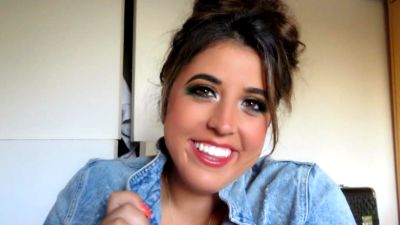Foreign Secretary James Cleverly told not to leave Qatar without answers over British woman death

Foreign Secretary James Cleverly has been told "not to get back on a plane to London" until he has convinced Qatari authorities to properly explain how a British women was killed in a car crash.
Rafaelle Tsakanika, from Cambridge, died in a two-car hit-and-run near Doha on 30 March 2019.
More than three years on, an inquest has been held into her death to try to get to the bottom of what happened.
But speaking outside Huntingdon's coroner's court, a spokesman for 21-year-old Ms Tsakanika's family said too much remained unknown.
"We've all sat in the court today listening to harrowing evidence from the parents doing their best to explain to the coroner what happened," said spokesman Radd Seiger.
"But none of us have really been able to help his with his inquiries. The Qataris are sitting on evidence. They have CCTV footage, they have other evidence that they have steadfastly refused to hand over to the coroner."
Foreign Secretary Mr Cleverly is currently in Qatar and could be seen sitting alongside David Beckham at England's opening World Cup match.
Mr Seiger said the minister needed to put pressure on authorities to fully investigate Ms Tsakanika's death.
"I want to put a call out to [Mr Cleverly] right now for him to meet with us - and to not get back on that plane to London until he has secured the evidence that is going to help this family understand how Raffy came to die," he said.
During the inquest, Ms Tsakanika's father, Donal Sullivan, a construction specialist, said his work had taken the family to Qatar over the last 10 years. He had been involved in "four or five" of the new World Cup stadiums as well as extending the airport.
Mr Sullivan said that when Ms Tsakanika, known as Raffy, did not return home one day they "knew something was wrong" as it was "most unlike her".
After being "pushed around from pillar to post" by police, they decided to go to the hospital.
"We just started literally walking around trying to find my daughter," Mr Sullivan said.
He said that in the hospital's admission book there was "one entry that was unknown and we felt we had to go and explore that".
Mr Sullivan said they were "directed to the morgue" and there was a "picture of Raffy's passport lying in front of us". A worker "gestured to one of the drawers" and they identified Ms Tsakanika.
Mr Sullivan said: "This is like a jigsaw - we're piecing bits together as we go."
He said police took them to the scene of the crash and they were shown the car that Ms Tsakanika had been in, at the police compound, adding that they were not allowed to take photos.
He said they brought her body back to the UK, adding: "At one point she was our only evidence.
"We didn't know what happened and we didn't trust anybody."
Court documents, seen by the PA news agency, show a teacher called Mubarak Al Hajri was convicted in Qatari courts of causing Ms Tsakanika's death, causing serious injuries to her friend, driving in a way that endangered lives, fleeing the scene of an accident, and speeding.
He was jailed for two months.
The family was told Al Hajri had been overtaking in a space between the fast lane and the central reservation when the crash happened.
Alex Routt, a forensic collision investigator, was instructed by the coroner to analyse the available evidence.
He said that the crash was estimated to have happened at 12.10am, and a speed camera clocked Al Hajri's car at 191km/h (118mph) at 12.06am, and a second camera clocked it at 181km/h (112mph) at 12.12am.
He said he had been told that Al Hajri's vehicle appeared damaged in the second photo, but added: "I haven't seen those photographs and they haven't been disclosed."
During questioning by barrister John Goss, he agreed that his analysis was hindered by the lack of information provided by the Qatari authorities.
Mr Routt said he had been provided with "few photographs taken on the night by Qatari police".
A post-mortem examination carried out at Addenbrooke's Hospital in Cambridge in April 2019 recorded that Ms Tsakanika died of traumatic head and abdominal injuries.
Ms Tsakanika's mother, Jo Sullivan, said, as she fought back tears at the start of the inquest, that her daughter was "adored by everybody".
"I had what I can describe as the best 21 years of my life," she said.
"Raffy was an absolute gift to us and her community.
"She was adored by everybody and she just saw the best in everybody."
She continued: "Our lives have just been destroyed."
Simon Milburn, area coroner for Cambridgeshire and Peterborough, adjourned the hearing until a date to be fixed while he considered his conclusion.
A spokesman for the Foreign, Commonwealth and Development Office said: "We have provided support to the family of a woman who died in Qatar in 2019 and raised her case with the Qatari authorities at a senior level. We stand ready to offer further consular assistance as appropriate."
Want a quick and expert briefing on the biggest news stories? Listen to our latest podcasts to find out What You Need To Know